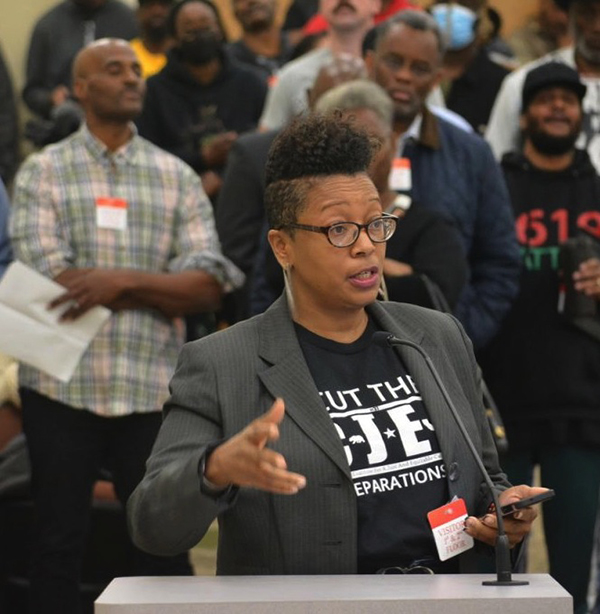LOS ANGELES — Business owners who don’t speak English as a first language have struggled to obtain federal loans during the coronavirus pandemic.
In late March and early April, the Small Business Administration launched the Emergency Injury Disaster Loan and Paycheck Protection programs to provide low-interest loans to small businesses reeling from the effects of the pandemic. But confusing documentation and inflexible standards for procuring credit has made obtaining those loans a burden for many entrepreneurs.
While the federal government has left many business owners to fend for themselves, nonprofit organizations have stepped in to help guide entrepreneurs through the complexities of accessing loans.
Xiomara Peña is the program director for Small Business Majority, a nonprofit that provides business owners with access to translated documentation, as well as connecting entrepreneurs to reliable local lenders. Peña said that documents offering frequently asked questions, U.S. Treasury guidelines for the Paycheck Protection Program and much of the application itself are only available in English, and even the translated materials remain confusing.
“While there have been efforts to translate and distill key information, ultimately a lot can be lost in language translation, so having a concrete resource for these entrepreneurs is a little more challenging. It’s left to advocacy groups to fill in that gap,” Peña said.
Since California Gov. Gavin Newsom first issued a stay-at-home order in March, consumer spending has plummeted and business revenues have taken a hit. In California, 44% of small businesses have closed since the beginning of the pandemic, according to a study by Small Business Majority.
The pandemic has hit minority-owned businesses particularly hard. A recent study by Global Strategy Group, a public relations and research firm, found that 45% of all black- and Latino-owned businesses expect to be forced to close in the next six months.
Minority businesses have also struggled to obtain federal loans. The same study found that just 12% of black and Latino business owners were able to receive funding through the Paycheck Protection Program.
For some minority business owners, the difficulties are compounded by the language barrier. Supporting loan documentation is often unavailable in the entrepreneur’s native language, and even just a few mistakes in filling out the application can result in the loan’s denial, Peña said.
Chris Tilly, a professor of urban planning at UCLA, said that a major difficulty non-native speakers encounter in filing for a federal loan is in deciphering the technical financial language required to fill out the necessary paperwork.
“If English is a second language for you, there’s all kinds of unfamiliar words, idiomatic usages and financial terms that might be understandable to the average English speaker but baffling to a person who is still learning English or using Google to make sense of the form,” Tilly said.
Small Business Majority attempts to address this problem by educating entrepreneurs through webinars hosted with other organizations, including the Los Angeles Small Business Development Center and IDEAL CDC, a nonprofit which focuses on empowering low-income individuals in the Latino community. These organizations provide technical support for entrepreneurs by translating loan application paperwork and breaking down complex financial documents into understandable language.
“Education is first for this community and that’s one of the areas where we meet the need the most,” Peña said. “We’re connecting folks to our technical assistance partners, and that ecosystem building is incredibly important for business owners.”
Lei Zhang is the owner of Little Fox Bilingual Preschool & Academy, a daycare center located in El Sereno. Zhang runs the center herself with the help of one assistant and had to apply for an Emergency Injury Disaster Loan after parents stopped sending their kids to the center, resulting in a loss of 60% of her revenue.
When Zhang heard about Small Business Majority, she participated in one of its weeklong seminars, where many of her questions about the loan application process were answered. Zhang credits the seminar, and the resulting conversations she was able to have with other entrepreneurs and government officials who participated, as being critical to her understanding of the loan program.
“We will be able to stay open because of this loan,” Zhang said. “The advantage to organizations like [Small Business Majority] is that they’re small and can be proactive in helping small businesses like us, they can educate us. I’m not an expert about these kinds of laws and stuff.”
Small Business Majority also combats predatory lenders, who often promise fast cash to business owners while charging an illegal brokerage fee for their services. Due to the language barrier, non-English speaking business owners are particularly susceptible to that kind of predatory lending, as they often struggle finding federally approved lenders online, Peña said.
“Specifically in the Spanish-speaking Latino community this is a very acute issue,” Peña said. “These business owners are getting approached by groups that are not acting with transparency in terms of the fees that they are actually charging.”
Tilly added that many banks are hesitant to approve loans for minority business owners, as such business owners often lack a previous business relationship with the lending institution. As a result, banks consistently prioritize their preexisting clients, who tend to be larger companies, leaving smaller business owners out to dry.
Where minority business owners should look for help is in community development financial institutions, Peña said.
Those institutions adopt more flexible standards for business owners who may have a shorter history of credit, a faulty credit record or insufficient collateral. As a result, Peña said those institutions have become critically important in supporting non-native English speaking business owners seeking federal loans.
Small Business Majority provides support to such entrepreneurs by connecting them directly to a local institution that can provide the capital that the business needs to stay afloat, Peña added.
By Stephen Wyer
Contributing Writer












